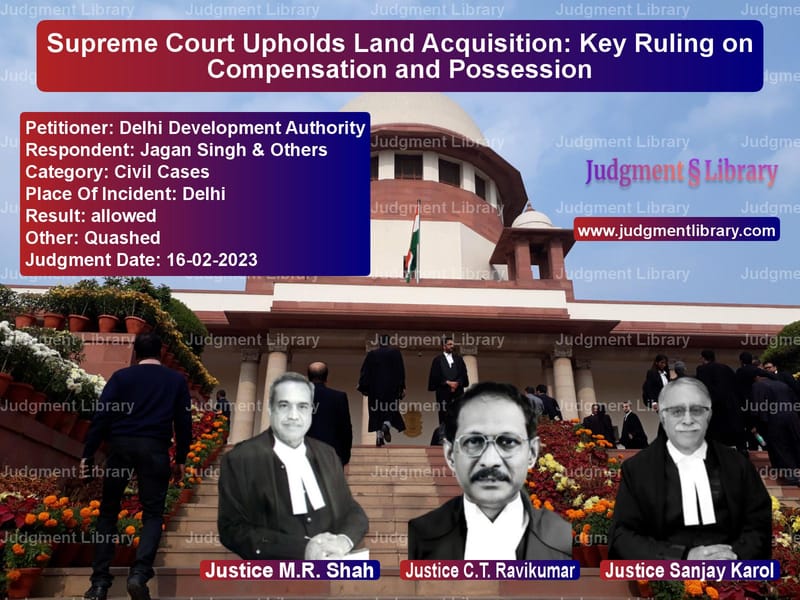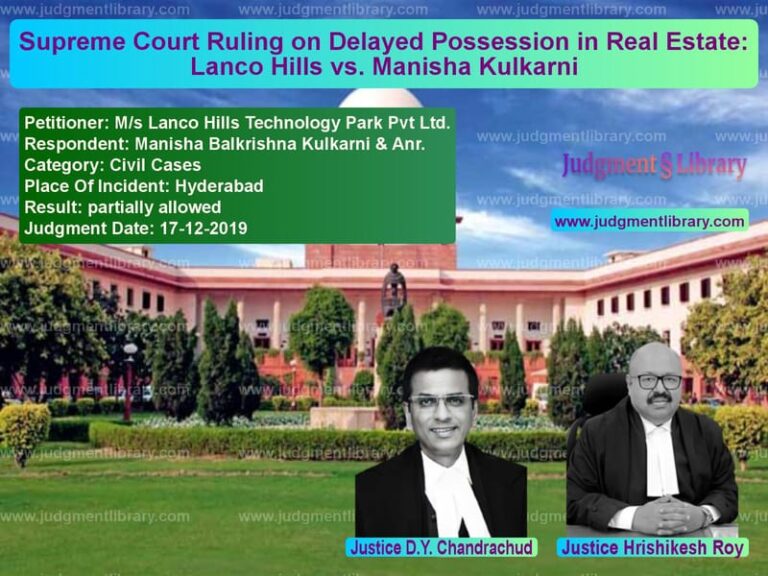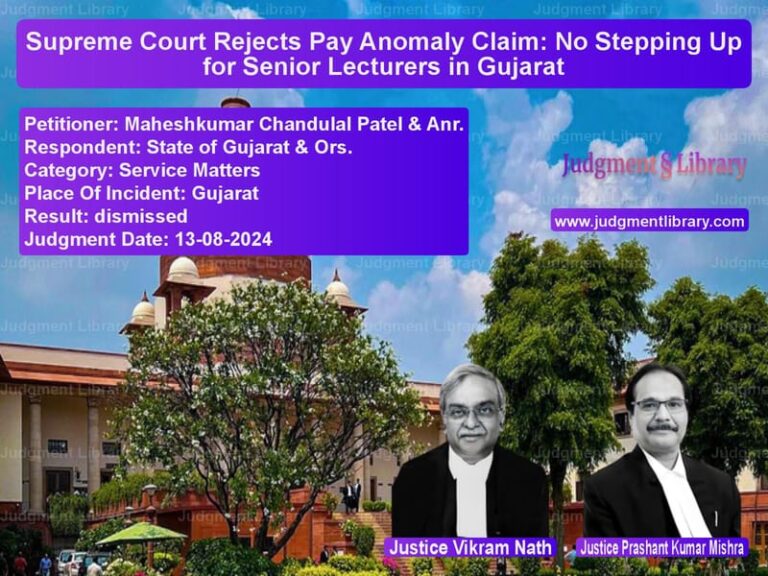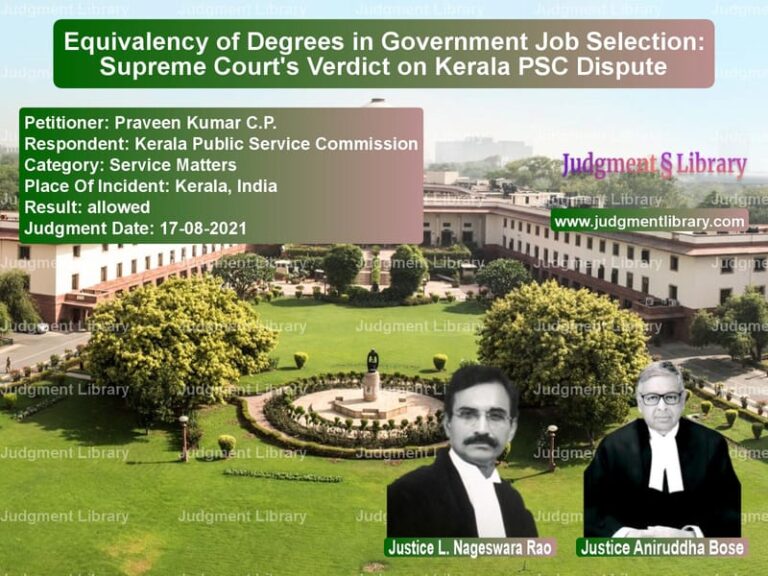Supreme Court Upholds Land Acquisition: Key Ruling on Compensation and Possession
The Supreme Court of India in the case of Delhi Development Authority vs. Jagan Singh & Others overturned the Delhi High Court’s ruling, which had declared the land acquisition process as lapsed under Section 24(2) of the Right to Fair Compensation and Transparency in Land Acquisition, Rehabilitation, and Resettlement Act, 2013. The Supreme Court relied on its Constitution Bench ruling in Indore Development Authority vs. Manoharlal to clarify that acquisition does not lapse merely due to non-payment of compensation if possession has been taken.
Background of the Case
The Delhi Development Authority (DDA) acquired land under the Land Acquisition Act, 1894, with possession taken on July 16, 2007. However, the compensation for the acquired land was not paid to the landowners. Citing the Supreme Court’s earlier judgment in Pune Municipal Corporation vs. Harakchand Misirimal Solanki, the Delhi High Court ruled that since compensation had not been paid, the acquisition had lapsed under Section 24(2) of the 2013 Act.
Read also: https://judgmentlibrary.com/supreme-court-quashes-high-court-order-on-land-acquisition-in-delhi/
The DDA challenged this ruling, arguing that the High Court erred in applying the now-overruled precedent of Pune Municipal Corporation. Instead, it contended that the Constitution Bench’s ruling in Indore Development Authority had settled the interpretation of Section 24(2) and should have been followed.
Arguments by the Appellant (Delhi Development Authority)
- The DDA contended that the High Court’s reliance on Pune Municipal Corporation was misplaced as that judgment had been explicitly overruled by the Constitution Bench in Indore Development Authority.
- It argued that as per the law laid down in Indore Development Authority, once possession of land has been taken, the acquisition does not lapse merely due to non-payment of compensation.
- The DDA maintained that since physical possession had been taken in 2007, the acquisition remained valid regardless of whether the compensation was deposited or paid to the landowners.
Arguments by the Respondents (Landowners)
- The landowners contended that since they had not received compensation for their land, the acquisition process had lapsed under the provisions of Section 24(2) of the 2013 Act.
- They relied on the ruling in Pune Municipal Corporation, which had previously held that if compensation was not paid within five years, the acquisition automatically lapsed.
- The landowners further argued that non-payment of compensation violated their rights under the 2013 Act, which was enacted to ensure fair compensation and transparency in the land acquisition process.
Supreme Court’s Analysis and Judgment
The Supreme Court extensively referred to its ruling in Indore Development Authority, which provided the authoritative interpretation of Section 24(2) of the 2013 Act. The key takeaways from the Constitution Bench’s judgment were:
- Possession Matters: If possession of land has been taken, the acquisition does not lapse merely due to non-payment of compensation.
- Reading ‘or’ as ‘and’: The word ‘or’ in Section 24(2) must be read as ‘and,’ meaning both possession and compensation must be absent for the acquisition to lapse.
- Compensation Tendering is Sufficient: If compensation is tendered but not accepted by the landowners, the acquisition remains valid.
- No Automatic Lapse: Delay in payment or deposit does not invalidate the acquisition but only entitles the landowner to compensation under the 2013 Act.
The Supreme Court, applying these principles, held that the Delhi High Court had wrongly applied an overruled precedent. The Court stated:
“Once possession has been taken, there shall not be a deemed lapse of acquisition under Section 24(2) of the 2013 Act. The High Court’s reliance on Pune Municipal Corporation was misplaced as it was specifically overruled by the Constitution Bench.”
Thus, the Court quashed the Delhi High Court’s decision and upheld the validity of the land acquisition.
Key Observations from the Constitution Bench’s Judgment in Indore Development Authority
The Supreme Court extensively quoted its ruling in Indore Development Authority, emphasizing that:
- Land acquisition does not lapse if possession has been taken, even if compensation has not been paid.
- Compensation that has been offered or deposited but not accepted by the landowner does not invalidate the acquisition.
- Acquisition remains valid unless both possession is not taken and compensation is not paid.
Impact of the Judgment
This ruling has far-reaching implications for land acquisition disputes in India:
- It provides clarity on the interpretation of Section 24(2) and puts an end to automatic lapses of acquisition solely due to compensation delays.
- It reaffirms the government’s authority in land acquisition matters and ensures that valid acquisitions are not overturned on technical grounds.
- The judgment safeguards infrastructure projects and urban development plans from being stalled due to lapses arising from non-payment of compensation.
Final Verdict
- The Supreme Court set aside the Delhi High Court’s decision.
- The land acquisition process was upheld as valid, dismissing the landowners’ claims.
- The judgment reinforced the binding nature of the Indore Development Authority ruling.
This ruling ensures that once possession is taken, land acquisition remains valid, thereby preventing misuse of legal provisions to stall development projects. The judgment is a significant milestone in land acquisition jurisprudence and reaffirms the Supreme Court’s role in resolving legal ambiguities in favor of development and infrastructure planning.
Read also: https://judgmentlibrary.com/supreme-court-overrules-high-court-on-land-acquisition-lapse-in-delhi/
Petitioner Name: Delhi Development Authority.Respondent Name: Jagan Singh & Others.Judgment By: Justice M.R. Shah, Justice C.T. Ravikumar, Justice Sanjay Karol.Place Of Incident: Delhi.Judgment Date: 16-02-2023.
Don’t miss out on the full details! Download the complete judgment in PDF format below and gain valuable insights instantly!
Download Judgment: delhi-development-au-vs-jagan-singh-&-others-supreme-court-of-india-judgment-dated-16-02-2023.pdf
Directly Download Judgment: Directly download this Judgment
See all petitions in Property Disputes
See all petitions in Judgment by Mukeshkumar Rasikbhai Shah
See all petitions in Judgment by C.T. Ravikumar
See all petitions in Judgment by Sanjay Karol
See all petitions in allowed
See all petitions in Quashed
See all petitions in supreme court of India judgments February 2023
See all petitions in 2023 judgments
See all posts in Civil Cases Category
See all allowed petitions in Civil Cases Category
See all Dismissed petitions in Civil Cases Category
See all partially allowed petitions in Civil Cases Category







